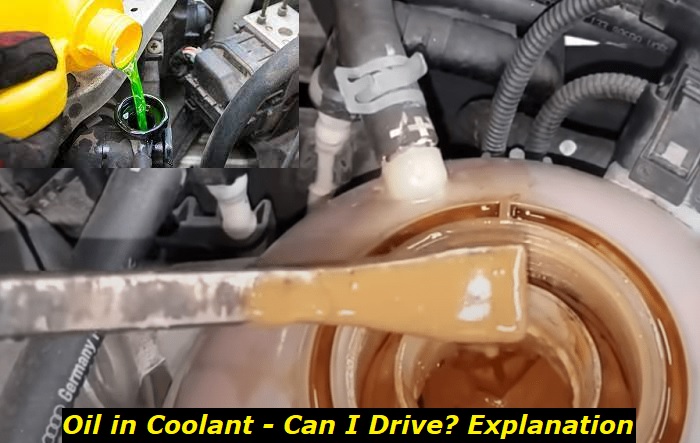Finding oil in your coolant is not a fun situation. It's generally worrying to find one of the engine's fluids in the wrong compartment. If you're checking your coolant's oil level, and you find traces of oil in it, you might wonder what it could mean. Why could there be oil in your coolant, and is it safe to drive like this?
Oil leaks highlights
- Level of urgency:medium
- Average mileage:over 50,000 miles
- Repair cost:$200 - $1,800
- DIY repair:only in some cases
- Commonreasons:head gasket, other gaskets, seals, fasteners
- If ignored:low engine oil level, contamination of units under the hood, engine damage
- How to solve:locate the leak and repair the system that is leaking

Why Is There Oil in the Coolant?
When there is oil in your coolant, it usually means that something has gone wrong with the engine. Your engine has two different closed systems that handle the flow of the engine oil and coolant. The fluids in these systems don't mix or come in contact. However, oil can get into the coolant through a leak in one of the engine's gaskets or seals.
If you're wondering why engine oil is in the coolant, but coolant doesn't get into the engine oil, there's a simple reason for that. The engine oil is constantly at a higher pressure, so the engine oil will leak into the coolant, rather than the coolant leaking into the engine oil.
There are three main ways oil can get into your coolant.
1) Head Gasket Leak
The main reason why you might see oil in your coolant is through a head gasket leak. This is the most common cause of this problem.
The head gasket is located between the engine block and the cylinder head of the engine and performs several critical functions. It maintains the compression pressure that the engine needs during combustion. More importantly, it prevents the engine oil and coolant from leaking and mixing.
When the head gasket fails, it can cause many different issues in the engine. The most relevant issue, in this case, is that engine oil will be able to leak into the cooling system. This contaminates the coolant and reduces its efficiency. Overheating and reduced performance will soon follow.
2) Damaged Oil/Coolant Heat Exchanger
Many modern cars, or cars with a turbocharger, come with an oil cooler. This component uses the coolant to cool down the engine oil, which can get quite hot in turbocharged engines. The heat exchanger works by having the two fluids come into close contact, without mixing. If a crack develops in the heat exchanger, a leak could develop.
3) Cracked Cylinder Head
This problem is much less common, but oil can leak into the coolant as a result of a cracked or warped cylinder head. This is typically the result of an overheating engine, causing the cylinder head to get hot and crack or warp. This causes a change in the engine's clearances that can render the head gasket ineffective. The engine oil will be able to leak into the coolant as a result.
4) Cracked Engine Block
This problem is similar to a cracked cylinder in that it is caused by excessive heat and poor cooling. In this case, a cracked engine block will allow oil to leak into different parts of the engine, and some of it might end up in the coolant.
A cracked engine block is a serious problem that often results in the entire engine needing to be replaced. This is because welding an engine block is difficult, and is often more expensive than replacing the engine.
Can I Drive With Oil in the Coolant?
There is a single answer to whether you should drive with oil in the coolant, and that is a hard no. Engine oil in your coolant indicates that there is a leak somewhere in your engine and that something has gone very wrong. If you continue to drive your car in this state, the problem could worsen, and you might end up with a ruined engine and some very expensive repairs on your hands.
Another reason why driving with oil in your coolant is because of how different these two fluids are. Engine oil is a thick viscous liquid that is meant to lubricate moving parts of the engine. Coolant, on the other hand, is thin and watery and is designed to absorb heat from hot engine components. The presence of engine oil in the coolant will affect how the coolant flows and performs its functions. This could lead to overheating, which can result in further damage to the engine.
Another issue is the fact that the oil is leaking. If you have engine oil in your coolant, there is a good chance that some of your oil is leaking into other parts of your car. This can cause some serious issues if the oil ends up somewhere else that it is not supposed to be. This could also cause your car to suddenly run low on oil.
Overall, oil in your coolant is a terrible situation for your engine's health, and the issue should be dealt with as soon as you can. You should stop driving your car until the issue is fully resolved.
What Should I Do About Oil in the Coolant?
When oil is in your coolant, you're dealing with two problems. The first problem is obvious, it's the contaminated coolant that is now in your engine. The other issue is the underlying problem that caused the oil leak in the first place.
Here are some of the things you will need to do to fix the issue of coolant in your engine oil.
1) Flush the Coolant System
Whatever the cause of the leak might be, you will eventually need to get rid of the contaminated coolant in your engine. You will need to have your car's coolant flushed to get rid of it. Flushing the coolant is a somewhat complicated process that involves draining the coolant from the radiator and replacing it with fresh coolant. If you don't feel comfortable doing this yourself, you can have a mechanic do this while they are repairing the cause of the leak.
After flushing your coolant, you should check to see if your engine oil is contaminated with coolant. This is unlikely, but it's not impossible. Coolant in your oil is not as critical a situation as having oil in your coolant, but it's still a bad time for your engine. If you find coolant in your engine oil, you should perform an oil change to get rid of the contaminated oil. Once again, you can have your mechanic do this if you prefer.
2) Fix the Cause of the Leak
If you find oil in your coolant, the best thing to do is have a certified or trusted mechanic take a look at your car. They'll be able to identify the cause of the leak and address it for you.
If the problem is a head gasket leak, you will need to have your head gasket replaced. The head gasket itself is not expensive. However, depending on the make and model of your car, the replacement might be very expensive due to the large amount of time and labor required to remove the cylinder head and access the cylinder.
A head gasket leak often comes along with damage to the cylinder head. If the cylinder head is cracked or damaged, you can either have it repaired or replaced. Repairing a cylinder head is often more expensive than replacing it, and might even be impossible in some cases. Replacing a cylinder head is a better choice because it eliminates the risk of welds failing.
While less common, a cracked engine block could also occur alongside a failed head gasket. Repairing a cracked engine block is often difficult and very expensive, so the best move is often to have the engine replaced. This is expensive as well, but is often cheaper than welding the engine block, and prevents the risk of the repair failing.
If the problem is a leak in your oil/coolant heat exchanger, you will need to have the exchanger replaced. This repair is much cheaper and easier than the other causes on this list.
Conclusion
Driving with oil in your coolant is a very bad idea. Once your coolant is contaminated with engine oil, it won't be able to perform its function effectively, and overheating is inevitable.
Oil ends up in coolant through a leak in the engine, usually because of a blown head gasket. Driving with your car in this state can allow the problem to worsen, and lead to complete engine failure. If you find engine oil in your coolant, you should flush your cooling system and have your engine repaired by a professional mechanic.
About the authors
The CarAraC research team is composed of seasoned auto mechanics and automotive industry professionals, including individuals with advanced degrees and certifications in their field. Our team members boast prestigious credentials, reflecting their extensive knowledge and skills. These qualifications include: IMI: Institute of the Motor Industry, ASE-Certified Master Automobile Technicians; Coventry University, Graduate of MA in Automotive Journalism; Politecnico di Torino, Italy, MS Automotive Engineering; Ss. Cyril and Methodius University in Skopje, Mechanical University in Skopje; TOC Automotive College; DHA Suffa University, Department of Mechanical Engineering






Add comment